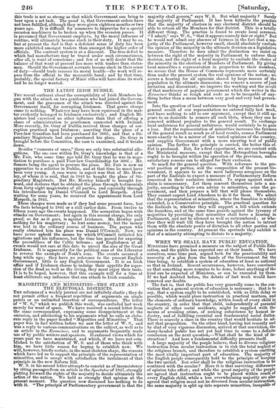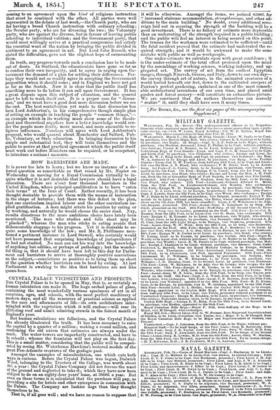WHEN WE SHILL HAVE PUBLIC E'DITCATION.
MnirsTeus have promised a measure on the subject of Public Edu- cation, and the public has expected one at their hands. We have ourselves, some time past, argued both for the practicability and necessity of a plan from the hands of the Government for the time being, to establish a system of education at least as national as that in Ireland. Recent occurrences, however, have convinced us that something more remains to be done, before anything of the kind can be expected of Ministers, or can be executed by them. If we had doubted before, the debate of last week would have removed our doubts.
The fact is, that the public has very generally come to the con- viction that a general system of education is necessary ; that is to say, that a system ought to be established, with as little delay as possible, which would place instruction in practical matters, and the elements of ordinary knowledge, within reach of every child in the country, in order that that child, independently of parental neglects or other social accidents, might be supplied with the means of avoiding crime, of seeking subsistence by honest in- dustry, and of fulfilling essential and fundamental social duties. There is scarcely a class in the country that would hesitate to ad- mit that proposition. On the other hand, having but recently and by dint of very vigorous discussion, arrived at that conviction, the many-headed public has not yet had time to come to a definite conclusion on the next question,—What shall be the kind of in- struction ? And here a fundamental difficulty presents itself. A large majority of the people believe, that to divorce religious instruction from secular instruction is to risk the total neglect of the religious branch, and therefore to establish a system omitting the most vitally important part of education. The majority of the English people consequently hold to the principle of keepuy the two united. But what shall be the religious instruction to be combined with the secular? Here it is that surviving differences of opinion take effect ; and while the great majority of the people are agreed that instruction ought to be placed within reach of every English child, while a less overwhelming majority are also agreed that religion must not be divorced from secular instruction, the same majority is split up into separate minorities, incapable of
coming to an agreement upon the kind of religious instruction that must be combined with the other. All parties were well represented in the debate of last week,—the Church party, who are for having a broad Church instruction with ordinary schooling; the Secular party, who are for divorcing the two • the Voluntary party, who are against the divorce, but in favour Of leaving public schooling to individual volition ; and the Government party, that would most willingly arrive at a practical compromise and satisfy the essential want of the nation by bringing the public divided in sentiment to an agreement in act. But Lord John Russell, who stated the difficulties, gave not the slightest hope of surmounting them.
In truth, any progress towards such a conclusion has to be made out of doors. In Scotland, the educationists have gone so far as to confess their own incapacity, and to agree in urging upon Go- vernment the demand of a plan for settling their differences. Per- haps they would not so readily agree in accepting the Government proposition when it should come; and in England we have not got so far as the Scotch. Now it is clear that the public itself has something more to do before it can call upon Government. It has a great dispute upon this subject of education, and the quarrel must be left to work itself out. It is a proper case for " discus- sion," and we must have a good deal more discussion before we see the end. The best contribution yet made to that discussion has been Lord Ashburton's, in his comprehensive though simple plan of setting an example in teaching the people "common things, '— an example which in its working must show some of the theolo- gical and theoretical argufiers how a better knowledge would ren- der the people more docile, more moral, and more amenable to re- ligious influences. Numbers will agree with Lord Ashburton's proposal, who would quarrel about Manchester and Salford, Pub- lic, Voluntary, or State education. In bringing discussion to his simple and substantial test, they will train themselves and the public to arrive at that practical agreement which the public itself must work out before Ministers can be required, or be competent, to introduce a national measure.

































 Previous page
Previous page